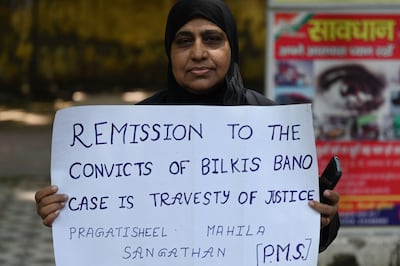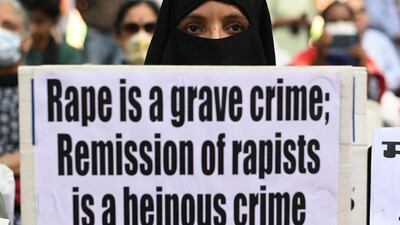India’s top court has agreed to set up a special bench to hear a plea against the remission and release of 11 men convicted of gang-raping a Muslim woman and killing her family during deadly sectarian riots in 2002.
Bilkis Bano was sexually assaulted and 14 of her family members were killed by a Hindu mob in western Gujarat state in March 2002.
The 11 men were released on remission by India’s Hindu nationalist Bharatiya Janata Party government in August last year, after one of them pleaded for early release following 15 years in prison from 2008.
Ms Bano had unsuccessfully challenged the remission and release of the men, followed by another petition seeking a review of the court order over a plea by one of the convicts, Radheshyam Shah, who approached the Supreme Court in May last year for remission.
Chief Justice Dhananjaya Yeshwant Chandrachud and justices PS Narasimha and JB Pardiwala assured Ms Bano’s lawyer Shibha Gupta that a new bench will be formed for an urgent hearing.
Violence broke out in Godhra city in Gujarat in 2002 after 59 Hindu pilgrims were killed by a group of Muslims. The attack led to widespread largely anti-Muslim violence across the state and more than 1,000 people, the majority of them from the minority community, were killed in days of rioting in the state.

Ms Bano was 21 and five months pregnant when she was raped as 14 members of her family were killed by Hindu villagers in March 2002. Seven bodies were never found.
The dead included her mother, a day-old niece and her toddler daughter Saleha, whose head was smashed with a rock.
The verdict to release the convicts shook the nation and more than 6,000 Indians, including eminent writers, rights activists and former bureaucrats signed a petition last year urging the top court to revoke the release of the convicted men.
Viral images and videos of the convicts being feted with sweets and garlands outside the jail led to widespread condemnation and street protests, amid demands that the courts intervene to end a “grave miscarriage of justice”.


